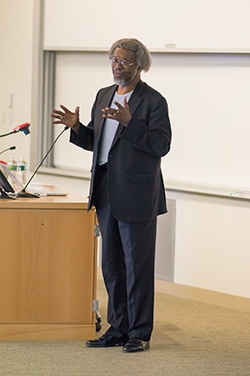Sylvester James Gates Jr., an internationally recognized theoretical physicist and a professor at the University of Maryland, College Park, will be Dartmouth’s third Roth Distinguished Scholar. He’ll be in residence for the 2015-16 academic year.

Physicist Sylvester James Gates Jr., the next Roth Distinguished Scholar, spoke at Dartmouth’s E.E. Just Symposium last year and in 2012. (Photo by Eli Burakian ’00)
“We are thrilled to be welcoming such a world-class scholar to Dartmouth,” says David Kotz, the Champion International Professor in the Department of Computer Science and the associate dean of the faculty for the sciences. “He will be an inspiration to students and faculty across the sciences, and will no doubt be the focus of many inspiring conversations.”
Gates, who has taught for more than four decades and has worked at science outreach through many appearances on television and in films, says he’s excited about coming to Dartmouth.
‘‘I am very much looking forward to interacting across disciplinary boundaries with colleagues at Dartmouth,” he says. “My own research interest these days spans theoretical physics, mathematics, and even coding and cryptographic theories. I am hoping to find people to mentor me as I continue to expand my knowledge.’’
The Roth Distinguished Visiting Scholar is endowed by Daryl and Steven Roth ’62, Tuck ’63, and their family to enhance the Dartmouth community by bringing to campus exceptional thought leaders who will inspire students and broaden the range of intellectual inquiry on campus. Steven Roth is a Dartmouth trustee.
The second Roth Scholar was Robert Staiger, an expert on global trade and international economics from the University of Wisconsin, Madison who spent the 2013-14 year at Dartmouth and has since joined the College’s economics department. The inaugural Roth Scholar, in 2012-13, was photojournalist James Nachtwey ’70. Roth scholars engage the community through lectures, seminars, and informal interaction with students and faculty. The endowment supports the scholar’s research, practice, and housing during the 10-month residency.
Gates visited campus last year as the keynote speaker at Dartmouth’s annual E.E. Just Symposium. In his address, Gates offered a nontechnical introduction to the subject of gravitation waves, phenomena first theorized by Einstein as being ripples in space-time that might be traced back to the Big Bang.
Michael Mastanduno, dean of the Faculty of Arts and Sciences, says, “Dartmouth is extremely fortunate to welcome such a renowned scientist back to campus. With his deep intellect, collaborative nature, and passion for teaching, he will be a terrific addition to our community.”
Gates has a distinguished record of research, a commitment to teaching, and a mission to engage everyone in an appreciation of physics. He works at the intersection of mathematics and physics to understand the organization and behavior of matter and energy in the universe. At Dartmouth, Gates will work on developing theoretical tools for enhancing the understanding of theories that cannot now be proven. He says he hopes to collaborate with faculty and students in mathematics, physics, and computational science.
‘‘I am also looking forward to the opportunity to bring some of my activities in the public policy domain to benefit students as they consider possible careers,” he says, adding, “If I am very lucky, I might also have the chance to indulge my interest in history.’’
Gates has taught for 43 consecutive years, most recently at Maryland, where he holds the John S. Toll Chair in Physics, is a Distinguished University Professor, a University of Maryland Regents Professor, and director of the Center for String and Particle Theory. He has also taught at Howard University, the University of Western Australia, Gustavus Adolphus College, and Stellenbosch University in South Africa.
In 2011, Gates received the National Medal of Science, the nation’s highest honor for scientists, engineers, and inventors, in recognition of his service to scientific research and outreach.
He runs workshops and summer programs to promote STEM education and is a dedicated mentor, having supervised the thesis work of more than 25 PhD students and advised hundreds of undergraduate and graduate students. He has appeared on the PBS series NOVA, and in a number of other shows and videos. This year he is slated to appear in five science documentaries.
A graduate of the Massachusetts Institute of Technology, where he received a BS and PhD, Gates has served on President Obama’s Advisory Committee on Science and Technology and is a member of the Maryland State Board of Education. He works with the National Commission of Forensic Science to improve the quality of forensic science, and holds membership in a number of organizations, including the American Physics Society, of which he is a fellow; the American Association for the Advancement of Science; and the National Society of Black Physicists. In 2013 he was the first African American physicist elected to the National Academy of Science.
